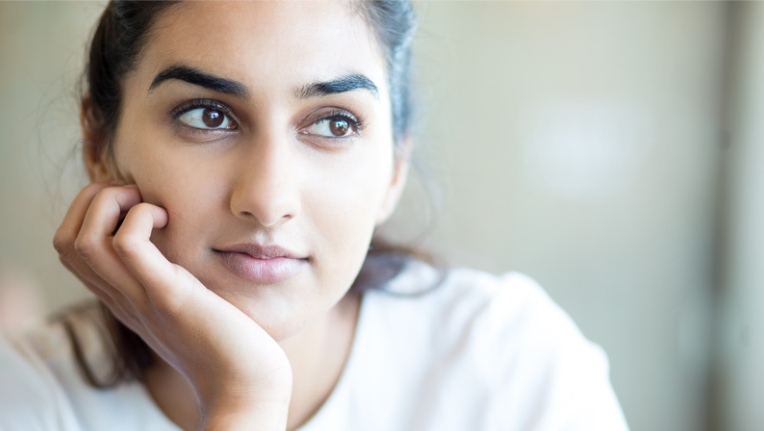The topic of body image is a constant discussion topic in the eating disorders community, especially more and more as we begin to see the harmful effects of diet culture and the prevalence of anti-fat bias. The deeper we dive into the subject, the more we learn how weight stigma affects our bodies. Well, not really all bodies. We know a lot about how it affects one specific type of body—the white cis-gendered female one. When it comes to the male body image experience, there is more information today than ever before, but we are still quite a way behind compared to the female conversation.
Before I go one sentence further, I want to point out the glaring issue that comes up when we begin to examine the male body image experience and the impact of weight stigma: We cannot lump this conversation under one large umbrella of “the male experience.” By nature of how we phrase the question of “male body image” means we assume, all those who identify as male, must have the same experience. Clearly that is not true and not consistent with how many folx in the eating disorders community embrace our intersectionality to the conversation. There is no one “male experience.” There are several, and each will be influenced by our intersections. The white, cis-gendered, thin, upper middleclass body image experience will be vastly different than the trans-gender, person of color, living in a larger body from a similar upper middleclass setting. All of the things that we identify as will influence our embodiment. It’s really almost impossible, and often exclusionary, to try to boil down the male body image experience into one narrative.
With that being said, though, one area that has an overlap across the different identities is the anti-fat bias that exists in our society. It is powerful and pervasive and affects all of us. In doing this work over time, I’ve seen that weight stigma does indeed affect men, and what often makes the problem much worse is this: there is virtually no safe space given to men when it comes to talking about the impact of weight stigma and body image issues. How can we address the problem when we can’t even name it for the individuals impacted? Why would someone feel safe to discuss their internalized fatphobia if all the messages they’ve received up until now has been, “This topic is not acceptable to discuss in front of others.”
One change we can start to make is how we think about what masculinity is and how we define it. Those who identify as male are quickly taught by our current society that sharing emotions and vulnerability, especially when it comes to the insecurities around our body, is unsafe. When we share, or see someone share their story or show any insecurity around their body, it’s most commonly met with ridicule and judgment. It reminds me of being around a pack of predators—don’t let them notice you or sense any weakness, because, they’ll pounce on you and you’re done for. We learn this from an early age and we accept it as “locker room talk” or “it’s just boys being boys.” But I contend that this very act of normalizing the fear of being vulnerable is one of the key things that needs to change for us to make topics like body image more accessible to men.
Another area that I see as a problem is that we are placing unrealistic expectations on those who identify as males and their bodies. I love all the superhero movies that have come out over the past ten years, but make no mistake, it has impacted the male body image for sure. Just look at the Halloween costumes of superheroes that are being made now for children. They have abs and six packs sewn into them. I mean, come on, what five year-old needs the abs added to their costume to feel like they are really Thor or Superman? At that age, all you need is the hammer, cape and the basic outfit. With this simple addition of abs, we are forcing a strong connection: to be a superhero, you must have abs.
I’d like to connect some dots from what we’ve already discussed. In the most recent Avengers movie, one of the characters, Thor, has an experience that exemplifies many of the things we are talking about in this post. After experiencing a traumatic event, the character experiences feelings of grief and failure. How does he cope with this feeling? He isolates himself and turns to food and alcohol to help self-soothe. This leads to him gaining weight and when his, “FRIENDS” reconnect with him, what is their first reaction? Shock that he’s gained weight, which leads to a whole sub-plot line that includes numerous fat jokes at the character’s expense. Never is there a line like “How can we support you?” “Is there something that you are struggling with that we can help you with?” “We are here for you, no matter what.” Instead, he’s met with jokes and ridicule, even from his own mother when she says, after a touching scene about his humanity, “And eat a salad, will you?”
Even with the most intense manifestation of masculinity, a superhero, invisible to all foes, is not immune to grief and failure. We, who identify as male, have this narrative where we are all powerful, capable of controlling so much in and around us, and at times, a superhero. But if we can see that even the God of Thunder can feel grief and sadness, so can we. The lesson, though, is clear: Be careful when you do, because even your closest allies will judge you and your body.
I’d like to say that we’ve come so far, but to be honest, we are just scratching the surface on this issue. If I had my way, what I would love to see is this:
- More stories of the male experience and body image, including stories of men of color, LGBTQ stories, body diverse stores, and bodies across all different socioeconomic statuses.
- Teach young men the power of vulnerability. Adults should model what it means to be open and honest about feelings and to embrace them as an asset, not a liability.
- Understand that when we who identify as male—share our body story, we are doing so in a world that, in many ways, makes it unsafe for us to do so.
Aaron Flores’s private practice is in Calabasas, CA. He uses Intuitive Eating and Health at Every Size® in his work to help individuals learn how to make peace with food and their bodies. He is a Certified Body Trust® provider and he also the co-host of the popular podcast, Dietitians Unplugged.






